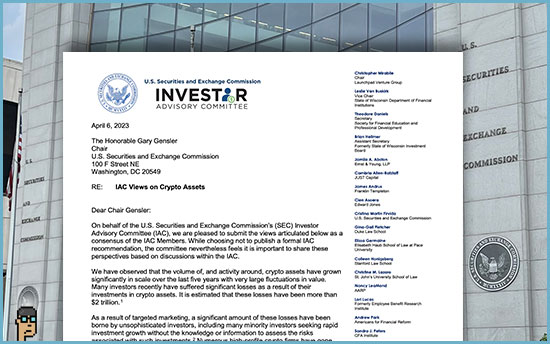Here’s today’s blockchain tipsheet… prefer it by email? Sign up here.
investors advise enforcement
A letter dated April 6 from the Securities Exchange Commission’s (SEC) Investor Advisory Committee (IAC) – and now published on the SEC’s website – appears to fully support the position of Chairman Gary Gensler on what should be done about digital assets.
The letter reads, in part: “We believe that virtually all, if not all, crypto tokens are securities and that they, as well as the platforms and custodians dealing with them, are subject to regulation under the federal securities laws to protect investors. (…) The SEC should continue to be aggressive in bringing enforcement actions against companies that are violating the federal securities laws in the crypto space, including, issuers, custodians and those acting as unregistered platforms that offer trading in crypto asset investments.”
Read the letter (PDF) – SEC.gov
Among a wide range – in terms of industry – of the letter’s signers is the IAC’s Chair Christopher Mirabile, a venture investor at Boston-area Launchpad Venture Group. It was only in December that Mirabile discussed his role in the committee and was quoted on the Angel Next Door podcast as saying, “The only way crypto really thrives is if we provide it with a regulatory framework that protects investors.” Read that one. Did he change his mind?
state versus federal
Apparently feeling the cold shoulder from the federal government, the state of Wyoming has decided to defend the ‘legitimacy’ of its bespoke digital assets framework used by crypto bank Custodia. CoinDesk reports, “Wyoming Attorney General Bridget Hill filed a motion with the U.S. District Court in Wyoming asking for permission to intervene in Custodia Bank’s lawsuit against the Federal Reserve Board and the Kansas City Fed (whose jurisdiction includes Wyoming) for delaying and ultimately denying the crypto-friendly bank’s application for a master account and membership with the Fed.” Read more.
How much of this battle is “red state” Wyoming versus the “blue” U.S. Treasury of the Biden Administration cannot be dismissed. On the other hand, would a Republican executive branch make a difference in this case? The Fed is the Fed (at least, for now).
more tips:
Custodia Bank Inc v. Federal Reserve Board of Governors Memorandum in Support of Motion — Document #133 – courtlistener.com
state of crypto
Venture capital firm a16z has published its annual “State of Crypto” report and identifies several key takeaways from the past year which includes regulatory challenges: “The U.S. is losing its lead in web3. Between 2018 and 2022, the proportion of crypto developers based in the U.S. vs. the rest of the world fell 26%. Thoughtful regulation can encourage crypto builders to innovate and grow these technologies safely in the U.S.” Read the blog post.
a16z also announced something it calls the “State of Crypto Index” which takes various data inputs such as developers in the crypto space, verified smart contracts and more and turns all the data into a sense of how things are heading on a monthly basis. As of this month, the Index shows crypto to be at a momentum stage similar to 2021.
more tips:
State of Crypto 2023 (60 pages – PDF) – a16z
State of Crypto Index – a16z
Yellen watching digital assets
Digital assets remain on the radar of U.S. Treasury Secretary Janet Yellen according to her opening remarks at the Annual International Monetary Fund-World Bank Spring Meeting. “We are also focused on monitoring and adapting our regulatory frameworks to risks posed by digital assets and the changing climate,” she said.
On her priority list according to her press release, digital assets came fourth after U.S. and global banking safety and soundness, and the implementation of Basel III – the international regulatory framework for banks post-Great Financial Crisis of 2008-2009. Read the release.
El Salvador’s digital assets license
Digital token platform provider Bitfinex says it has been granted a “First-Ever Digital Assets License” in El Salvador. The press release explains that the license “will enable the issuance and trading of innovative real-world tokenized assets such as equities and bonds.”
Bitfinex adds that this opportunity has come about under the auspices of El Salvador’s new Digital Assets Issuance Law known as “Ley de Emisión de Activos Digitales (PDF).” The country started accepting Bitcoin as legal tender as of 2021 and passed new crypto-friendly laws this past January.
As for examples of exactly what products the license will enable, Bitfinex claims that there are “both small and large issuances scheduled to be announced throughout the remainder of this year.” Read the press release on Bitfinex’s blog.
virtual photo op – day 2
“This afternoon [New York Department of Financial Services] Supt. Adrienne Harris met with Tom Mutton, Director of FinTech, and members of the
[Bank of England] delegation to discuss cooperation on virtual currency regulation and continued transatlantic collaboration.” – NYDFS on Twitter
more tips:
Yesterday: NYDFS with the Bank of France
still more tips
Escaping the Data Swamp: Remarks before the RegTech 2023 Data Summit – Hester Peirce, SEC Commissioner – SEC.gov
CFTC Charges New York Resident with Fraud and Misappropriation in Digital Assets Trading Scheme – CFTC.gov
Open Meeting Agenda, April 14, 2023 – Reopening of Comment Period for Amendments to Rule 3b-16 under the Exchange Act Regarding the Definition of “Exchange” – SEC.gov
Venture Capital is planting crypto seed – Axios
H.R.1747 – Blockchain Regulatory Certainty Act – Intro’d on 3/23/23 – Referred to House Financial Services – Congress.gov
If you would like this delivered as a newsletter, please sign up here.

